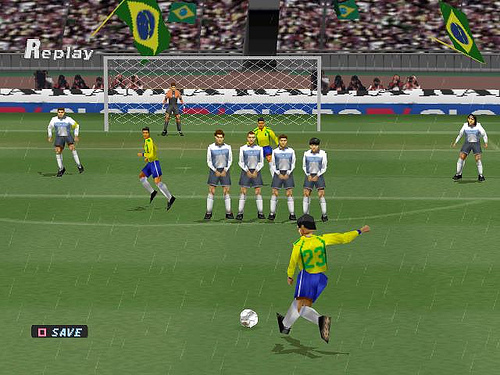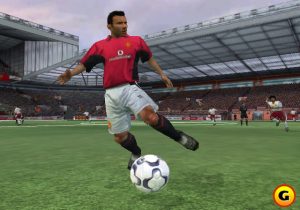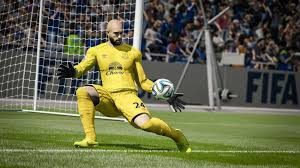What makes a great football(soccer) game?

Along with gaming, football is probably my biggest hobby.
I’ve played at least twice a week since the age of 8, and been a season ticket holder at my beloved Aston Villa for the past 18 years. Football games have therefore always been hot on my radar, and thankfully there have been a reasonable amount of quality games in the genre over the years. Many attempts however miss the mark, failing to capture what makes the beautiful game fun, and this is certainly true of many of the big-budget releases.
I will outline here what I think makes a successful football game, with examples of good and bad things games have done in the past. (NB: To avoid confusion I will refer to the in-game footballers as ‘players’ and the person playing the game as the ‘gamer’).
Balance
One of the main difficulties developers face in creating a football game is the balance between the individual player/teams’ skill, and the gamer’s ability. In reality, real players obviously have different degrees of talent – Iniesta is a much more accurate passer of the ball than Robert Huth. But turning degrees of individual ability into a quantifiable stat isn’t always easy in itself, and more importantly can come at the detriment of the gamer’s sense of fairness and enjoyment.

The individual attributes of players like Giggsy should serve to just enhance the gamer’s skill at the game, not dominate the experience and determine results.
Passing accuracy is quite a good example to use to illustrate this issue. Some stats are reasonably easy to quantify, such as speed. Holding the run button down with a fast player will make him/her move quicker than a slower player. However with something like passing accuracy, the situation isn’t as clear-cut – the issue arises where the gamer might put the correct direction and weight on the ball, but be passing the ball with a poor-passing individual. Should the game make the pass fail? Or not be as strong/accurate? If so, to what degree? Should it happen every time, or be based on luck? Or should the gamer be rewarded with an accurate pass regardless, because the direction and weight was correct? And if that philosophy is adopted, what’s the point in having different player traits?
Football games have tackled this issue differently over the years. In the early days, first football games like Sensible Soccer and FIFA 95 simply had the same abilities for every player due to hardware limitations. The players’ ability was based entirely on the gamer’s input, and the only effect of picking a team was on the shirt colours. Over time, individual traits started to come in, with games in the ‘fourth generation’ such as ISS64 and Fifa 99 having a mix of universal mechanics that applied to all teams (in these cases ISS had automatic passing, FIFA automatic shooting) but with some players being quicker or stronger than others.
The better football games balance this issue with a slider-type effect. The key is that you want it to be possible to score a last-minute screamer with Phil Jagielka, but you want the likelihood of it to happen to be far smaller than doing it with Yaya Toure. But it still needs to be possible. So the solution is for better players to have a larger window of opportunity to pull off certain moves than weaker players, but a perfectly timed hit should still be possible. The more recent FIFA games have achieved this to some degree, though the element of blind luck (more on that below) is still a factor. I call it the slider effect because it’s best illustrated by FIFA’s penalty kick slider – the gamer has to land the marker in the middle of a continuously moving slider in order for the PK to be accurate. With the better players, the slider moves slower, thus increasing the window of opportunity and making it easier to pull off a successful shot. The weaker players have a fast slider, so whilst it’s still possible and crucially requires more skill to pull an accurate PK off with a player, it’s still doable by better gamers.
Unscripted events
During the fifth generation, EA’s FIFA and Konami’s Pro Evolution Soccer (PES) were the only real two options for a mainstream soccer sim. Despite strong sales of the former, in most critics’ and gamers’ eyes there was only one winner every year: PES. This was despite its clunky menus, laughably woeful commentary and lack of any licensed teams whatsoever (go on West Midland Village). The FIFAs of the time on the other hand had excellent levels of polish presentation, but they lacked in the area PES excelled in – gameplay.

Free-kicks should require skill, but there shouldn’t be a guaranteed, scripted way to score them each and every time.
The key difference was scripting. FIFA looked great, but you would score the same goal repeatedly from a pre-determined and limited set of scripts. This meant that once you had mastered the combination of input, there was nothing the opposition could do to stop you. One-on-one with a goalkeeper with (fat)Ronaldo in FIFA 99, all the gamer has to do is tap the shoot button, and the ball goes into the top corner. Every time. Players would always make the same runs, have a limited number of passing and tackling options available, and after a week of gameplay you’d have seen everything the game has to offer, and be winning games 10-9 against your friends.
PES on the other hand, was a completely different ball game. Every game was different, and it was notoriously difficult to score a goal. Seemingly random and unique things happened every game, things that were literally not possible in FIFA – the ball would sometimes ricochet back off the crossbar, onto the goalie’s head and back onto the post. FIFA didn’t allow this – giving you either the same goal or same spectacular save every time. In PES, the ball felt like a ball – unpredictable and influenced by the gamer rather than fully controlled by the gamer, whereas in FIFA the ball just felt like part of the script, obeying the strict pre-determined set of guidelines the rest of the game was held to.
In 2008, EA made the conscious realisation that this was lacking in their game. This great article on how EA turned FIFA around interviews engineer Gary Paterson, who joined EA in 2004. Paterson was hired to change the fundamentals of FIFA, and cites these elements of Pro Evo he looked to incorporate when criticising older FIFAs:
“Things like the success of a shot,” he explains. “It wasn’t based around context, it was just based around attributes. You have to start thinking of – is he under pressure, what kind of kick angle is it, how is the ball moving, what kind of animation is he using, think about how he’s going to strike the ball, and what effect striking the ball in that manner would have on the trajectory of the ball.”
It’s these contextual considerations that make a good football game, not how many licenses for the Hungarian Second Division it has.
12 years on from Paterson’s appointment, FIFA is dominant both commercially and critically. The last 6 incarnations all have Metacritic scores above 80, and it’s the shift from superficial glamour to authentic gameplay that has caused this.
Luck
In the real game of football, the element of luck is undeniably a factor. Keepers making howling errors, linesmen missing offsides, beach balls from the crowd entering the field… luck is part of the game.

There should always be a possibility – however remote – that the keeper has a shocker.
The difficulty in designing a football game is how much luck do you incorporate, if any at all? Applying chance to a game is always tough, as if it is to be fair and competitive between players then ideally luck should be minimizes and skill should be emphasized. But if the aim of the game is to emulate football – luck should technically be part of the experience.
Again, in older games luck wasn’t present, with games obeying a strict set of unbreakable rules. But in later more complex games, there was always a certain thrill knowing that the keeper could spill that Hail-Mary 40-yard lob, or that you could get away with a two footer from behind, however unlikely. Luck can and should be used to add to and enhance the experience. However FIFA 13 is a good example of a game where luck played too much of a roll. Every player had a chance of mis-controlling a ball, and whilst that’s technically true in real life, it simply happened far too often in FIFA 13 that it went beyond the point of feeling novel and became a regular hindrance, hampering the enjoyment of the game. The game at times felt beyond your control, whereas in the superior FIFA 12 every goal felt like an achievement for the player. Thankfully EA rectified this in FIFA 14, and subsequent iterations have been better still in this area.
There are of course a lot of other things that can determine the quality of a football game technical aspects like graphics and sound of course add to the experience. Commentary can be particularly immersion-breaking if not done well. However I feel it’s the features I’ve touched on that truly make or break a football game, and the more a developer considers these, the better the chances of a quality outcome for the game.